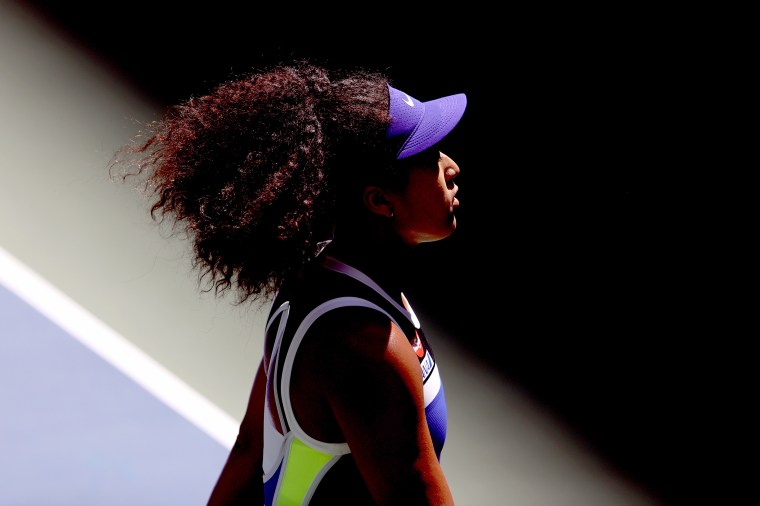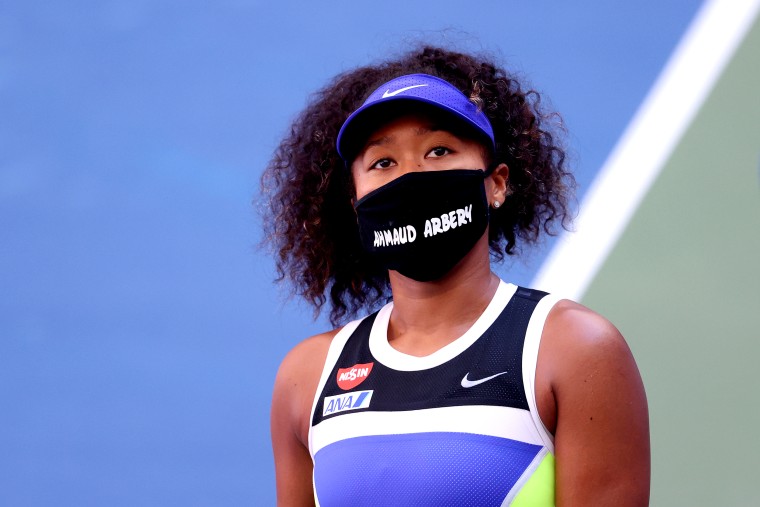I'm sure there are people who are unaware that this bias against black hair styles is a "thing". I mentioned it once to some German friends while visiting Germany several decades ago, although I didn't present it as a bias but that wearing my hair straight instead of in natural styles seems to make the white people I worked with more "comfortable".
Naomi Osaka’s hair doesn’t impact her 120 mph serve or powerful baseline play. But it does impact how she is perceived in the bright, white tennis world.
Naomi Osaka of Japan looks on during her Women's Singles third round match against Marta Kostyuk of the Ukraine on Day Five of the 2020 US Open.Al Bello / Getty Images
Sept. 12, 2020, 10:57 AM PDT
By Robyn Autry, chair of the Sociology Department at Wesleyan University
Osaka has grabbed headlines this tournament by wearing masks emblazoned with the names of victims of racial violence.
Alongside her outstanding athleticism, though, Osaka has grabbed headlines this tournament by
wearing masks emblazoned with the names of victims of racial violence: Philando Castile, Trayvon Martin, Ahmaud Arbery, George Floyd, Breonna Taylor and Elijah McClain. Black masks, white lettering. Her one-person protest feels even more powerful as she enters and exits the nearly empty stadium every match.
The masks draw our eyes up, but this is nothing new when it comes to Osaka. With her thick hair often pulled into a high ponytail and up through a visor, Osaka is accustomed to making a statement. It’s the sort of statement that Black bodies always make, whether intended or not, in predominately white spaces. As
Claudia Rankine wrote about Serena Williams in “Citizen: An American Lyric” — referencing Zora Neale Hurston — Black players appear against the sharp white backdrop of the tennis world.
Naomi Osaka of Japan wears a protective face mask with the name Ahmaud Arbery stenciled on it on Day Five of the 2020 US Open at USTA Billie Jean King National Tennis Center on Sept. 4, 2020 in Queens, N.Y.Al Bello / Getty Images
 Naomi Osaka of Japan looks on during her Women's Singles third round match against Marta Kostyuk of the Ukraine on Day Five of the 2020 US Open.Al Bello / Getty Images
Naomi Osaka of Japan looks on during her Women's Singles third round match against Marta Kostyuk of the Ukraine on Day Five of the 2020 US Open.Al Bello / Getty Images  Naomi Osaka of Japan wears a protective face mask with the name Ahmaud Arbery stenciled on it on Day Five of the 2020 US Open at USTA Billie Jean King National Tennis Center on Sept. 4, 2020 in Queens, N.Y.Al Bello / Getty ImagesArticle continued here: https://www.nbcnews.com/think/opinion/u-s-open-women-s-final-features-naomi-osaka-s-ncna1239914
Naomi Osaka of Japan wears a protective face mask with the name Ahmaud Arbery stenciled on it on Day Five of the 2020 US Open at USTA Billie Jean King National Tennis Center on Sept. 4, 2020 in Queens, N.Y.Al Bello / Getty ImagesArticle continued here: https://www.nbcnews.com/think/opinion/u-s-open-women-s-final-features-naomi-osaka-s-ncna1239914
